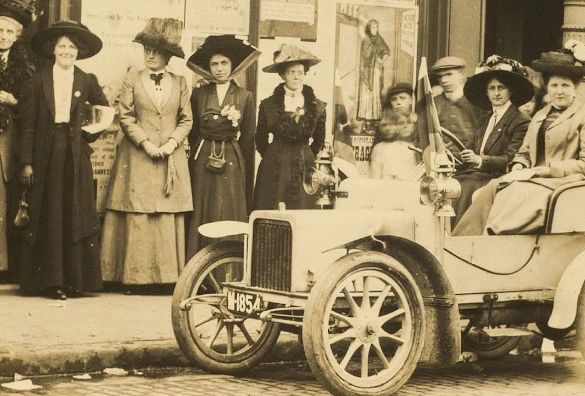Today marks International Women’s Day; a day devoted entirely to celebrating the achievements of women. Eleanor Rathbone is renowned for being an influential women’s rights activist and social reformer, but also for becoming the first woman to be elected to Liverpool City Council. Inspired by the “Utopia Calling: Remembering Eleanor Rathbone” exhibition, School of the Arts student, Heather Christian, looks at the woman who had such a remarkable effect on society.
“For many students at the University of Liverpool, Eleanor Rathbone is either the name of a building or the name of a benefactor from times gone by. In fact, Eleanor Rathbone was far more; a tireless activist for social justice, a campaigner for women’s suffrage, a University lecturer, and a pioneering female politician. In this year, the 70th anniversary of her death, we take a closer look at this truly remarkable woman.
Eleanor Florence Rathbone was born into the prominent Rathbone family in 1872. The Rathbones were a uniquely philanthropic family; Eleanor’s father was responsible for establishing the very first District Nursing system in Liverpool. Eleanor grew up close to her father, sharing the same commitment to social justice, and with his encouragement she won a place at Somerville College at Oxford.
Her heart, however, always remained with her home city. Eleanor’s passion for social reform first came to prominence in 1905, when she published a report into working conditions of the Liverpool Dockers. It was also at this time she helped to set up the School of Social Science at the University of Liverpool, becoming one its first lecturers.
Making history
To be a female lecturer in 1905 would once have been seen as an achievement in itself, yet this was just the beginning of Eleanor Rathbone’s impact upon society. In 1909 she made history by being elected to the Liverpool City Council, almost a decade before women won the vote, something even she herself was amazed by. Furthermore she was able to stay in this position for a staggering 25 years.
Jenny Higham, Special Collections and Archives manager reflects that: “Eleanor Rathbone was a remarkable woman who dedicated her life and her considerable energy to social reform. Her politics were fundamentally shaped by her feminism, and she campaigned both locally and nationally to bring about votes for women and introduce family allowances.
“Eleanor deserves to be remembered for her effectiveness as a Member of Parliament, and crucially one who was able to translate her ideas into practical achievements.”
Widows and dependants
The Utopia Calling Exhibition demonstrates that Eleanor was not content to be one of the first female politicians. Prominently displayed is a photo of Eleanor campaigning outside the offices of the Liverpool Women’s Suffrage Society alongside Millicent Fawcett, a leading Suffragist.
Eleanor pushed for women to become more involved in local politics and social aid and led the way by setting up organisations to support widows and dependants of soldiers from Liverpool killed during the First World War. In 1918, she argued for a system of family allowances paid directly to mothers. Even today she is acknowledged as pioneer of this system, eventually passed into law in 1945.
With the arrival of female MPs, it was only a matter of time before Eleanor was elected to represent Combined English Universities, including the University of Liverpool. She used her national platform to champion the cause of not just British women, but of females in places like India and Kenya. Despite such international reach, she always kept focus on the plight of the needy close to home and campaigned during the Great Depression for cheap milk and child benefit, measures which would later come to fruition.
Formidable
Rathbone came to be seen as a formidable politician (junior ministers would reportedly try to hide behind pillars at Westminster if they saw her coming) and stood against the pressure of Appeasement of the late 1930s to denounce Nazi Germany for its aggression and anti-Semitism.
When she died in 1946, Eleanor Rathbone had ensured that she wouldn’t be remembered just as an early female politician, but as a tireless campaigner for equality and social justice across Britain and the world. Her contribution to the University of Liverpool ensured it would go on to cater for all and her commitment to female suffrage and the rights of the poor were second to none.
Today the Eleanor Rathbone trust is still active in Ghana, helping to provide education to poverty-stricken children. Seventy years after her death it is more important than ever to remember the unique and long-lasting contribution of this determined and pioneering woman which has helped shape the fairer world we live in today.”
The exhibition is located in the Sydney Jones Library in Special Collections and Archives and will run until Monday 11th April.
